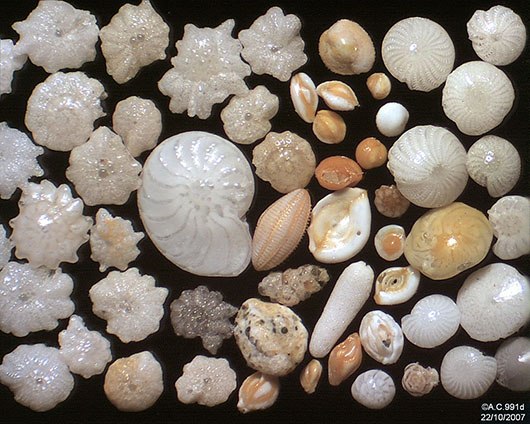Rising CO2 levels: not a toothless threat

St Andrews academics will tell an international audience of research scientists that experiments show microscopic organisms, called foraminifera (‘forams’), suffer the equivalent of tooth-decay as seawater becomes more acidic.
The findings will be presented at the third annual meeting of the UK Ocean Acidification Research programme being hosted by the University of St Andrews, Scotland on 24 July 2013.
Foraminifera are tiny single-celled organisms that build intricate shells to protect themselves. They feed on algal cells called diatoms, which they break open using tooth-like structures on their shells.
Experiments carried out at the University of St Andrews suggest that as seawater increases in acidity (reduces pH), these ‘teeth’ are reduced in number and size, with many becoming deformed. These alterations are likely to make them much less effective at feeding.
Since ‘forams’ may number 500,000 in a square meter of sediment, other organisms further up the food chain are also likely to be affected by these changes.
Professor David Paterson of the School of Biology said:
“The studies of foraminifera are only a small part of the story of ocean acidification impacts. But we know that many species were lost from the fossil record the last time that CO2 rapidly rose, around 55 million years ago, with other major disruptions to marine. The threat of future acidification is very real, and comes at a time when the human population depends more than ever on a healthy and productive marine environment.”
Carbon dioxide is a natural component of our atmosphere, essential for the growth of plants, terrestrial and aquatic, which sustain life on Earth. But too much CO2 is a great threat, being the major greenhouse gas responsible for climate change. Less well-known is the role of CO2 in increasing ocean acidity, by forming carbonic acid: this lowers pH and causes other chemical changes to seawater.
Marine scientists are seriously concerned that these changes will have a significant impact on marine life (and human life), with consequences for shellfish, cold and warm-water corals, as well as many other components of ocean food webs.
Dr Phil Williamson, Science co-ordinator of the UK Ocean Acidification research programme, said:
“There have already been enough measurements around the world to conclusively demonstrate that ocean acidification is occurring. But there are regional differences that we can’t fully explain. We now need joined-up science to observe not only chemical changes but also ecological responses, to improve threat assessments and provide the evidence for national and international policy action.”
The latest research results on these topics will be discussed at the UKOA annual meeting, and immediately followed by the second International Workshop of the Global Ocean Acidification Observing Network (GOA-ON); an international gathering of around 80 ocean acidification scientists from 25 countries, who are developing a global plan to improve the measurement of ocean acidification and its ecological effects.
A live webcast of the joint UKOA/ GOA-ON session will be available through the UKOA website on the afternoon of Wednesday July 24, 2013 (full details below).
Notes to News Editors
The live webcast of the joint UKOA / GOA-ON session will run 13:30 – 18:00, Wednesday 24 July 2013.
Presentations and speakers include (full programme available via link above):
- Awareness and action on ocean acidification (Jane Lubchenco, Oregon State University, USA)
- Environmental protection in the North Atlantic (Darius Campbell, Executive Secretary, OSPAR Commission)
- Framework for ocean observing and ship-based time series ¿ aiding the design of a global OA observing network (Maciej Telszewski, International Ocean Carbon Coordination Project)
- Update on the OA International Coordination Center (Lina Hansson, Ocean Acidification International Coordination Centre, International Atomic Energy Agency, Monaco)
- Promoting technological advances: the X-Prize (Paul Bunje, X PRIZE Foundation, USA)
- Why we need a global OA network (Wendy Watson-Wright, Executive Secretary, Intergovernmental Oceanographic Commission [IOC] of the United Nations Educational, Scientific and Cultural Organization [UNESCO])
- Where we are now: outcomes from Seattle 2012 (Jan Newton, University of Washington, USA)
- Introduction to the global OA observing asset map (Cathy Cosca, National Oceanic and Atmospheric Administration’s Pacific Marine Environmental Laboratory, USA)
- Observing OA in regional seas: a modeller’s perspective (Jerry Blackford, Plymouth Marine Laboratory)
- OA processes and impacts in US coastal waters (Dr Richard Feely, National Oceanic and Atmospheric Administration’s Pacific Marine Environmental Laboratory, USA)
- Observing OA in upwelling regions off South America (Rodrigo Torres, Universidad Austral de Chile & Nelson Lagos, Univ Santo Tomás, Chile)
- Observing OA and its impacts in the Pacific-Arctic (Jeremy Mathis, National Oceanic and Atmospheric Administration’s Pacific Marine Environmental Laboratory, USA)
- Observing OA and its impacts in the Southern Ocean (Pedro Monteiro, Council for Scientific and Industrial Research, South Africa)
The UK Ocean Acidification research programme (UKOA), led by the Natural Environment Research Council (NERC), is co-funded by the UK government via the Department for Food and Rural Affairs (Defra) and the Department for Energy and Climate Change (DECC).
For more information about the UKOA please contact: Dr Carol Turley, Knowledge Exchange Coordinator (oa@pml.ac.uk or +44 (0)1752 633100) or Dr Phil Williamson, Science Coordinator (p.williamson@uea.ac.uk, +44 (0)1603 593111, 07749 092287).
For information on the individual UKOA projects please contact Kelly-Marie Davidson (kdav@pml.ac.uk, 07879 260 143) or Dawn Ashby (daas@pml.ac.uk), both on +44 (0)1752 633401).
If you wish to pose questions to any of the UKOA scientists and/or GOA-ON speakers then please forward to Kelly-Marie Davidson (kdav@pml.ac.uk) and Kelvin Boot (kelota@pml.ac.uk).
Issued by the University of St Andrews Press Office. Contact Emma Shea on 01334 462167/07850900352 or email emma.shea@st-andrews.ac.uk
Follow St Andrews news on Twitter
Like us on Facebook
View the University’s latest news at www.st-andrews.ac.uk/news
Category Research